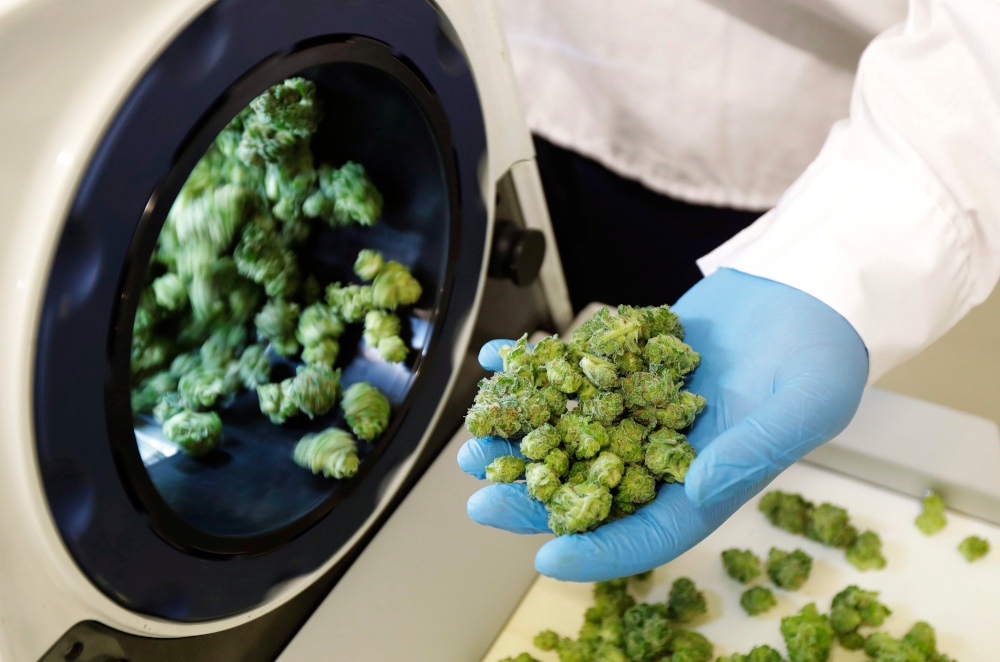Food vs Pot, Hemp, Wine : Sustainable Farming
 |
| Delta, BC. mayor :'Too much farmland taken by cannabis growers. Ted S. Warren, AP |
"[In recent years, leasable farmland has been harder to come by] because cannabis farmers could pay so much more.""It's like a land grab ... the green rush, they call it."Maud Powell, associate professor, Small Farms Program, Oregon State University"In the next year to two years, you'll see a lot of ... cities and counties regulate [cannabis] due to the economic insecurities everyone is facing."Jacqueline McGowan, founder, Green Street Consulting
"The competition here is marijuana, hemp and wine.You can get drunk, high and pain relief, but don't plan on eating.""Competition for land, especially last year, went through the roof. We had looked at purchasing a piece of ground, and the price that the hemp growers were willing to pay was phenomenally higher than we could ever pay with livestock."Angela Boudro, southern Oregon livestock producer"[This is] partially because of increased interest in such properties but also because of heavy restrictions in many states and localities on where cannabis cultivation operations may be located."Erika Stark, executive director, National Hemp Association"Here in southwest British Columbia, many of the food-producing greenhouses have been bought by the cannabis sector.""There's a conundrum in this: cannabis, like flax or grapes for wine, is considered agriculture [meaning its production is permitted on the reserve]."Kent Mullinix, director, Institute for Sustainable Food Systems, Kwantien Polytechnic University
 |
| Some neighbours are fighting back against the idea of quality farmland being used for marijuana-growing operations. (Nicolas Pham/Radio-Canada) |
Across Canada and the United States the coronavirus pandemic has led to the collapse of retail businesses, and a the same time the legal cannabis industry has set sales records across both countries in the past six months, the market's stimulation partially attributed to the presence of COVID-19. People under duress have turned increasingly to marijuana for relief, and the industry is booming. An unexpected revenue stream, as interest in cannabis has surged.
But the alter-effect is that farmers are concerned and land experts puzzle over competition for arable land being monopolized by pot.
The potential for the legalization of cannabis to create new revenue streams has been a hot topic with officials in at least three U.S. states. The drug remains federally outlawed in the States but close to two-thirds of American states have seen fit to legalize its use specifically for medical, and increasingly for recreational purposes in recent years. At the federal level, Canada took that step in 2018.
The global industry for legal cannabis globally has been given a value of over $9 billion, with roughly 90 percent of the business taking place in North America. Over two dozen jurisdictions in California plan to place cannabis-related initiatives on the ballot in November when voters flock to polls, according to Jacqueline McGowan, founder of Green Street Consulting. Budget issues linked to the pandemic have helped create an interest in cannabis as a vital new revenue stream.
Outdoor production of cannabis has become popular in rural areas where favourable growing conditions pertain, especially in California and the Pacific Northwest, while indoor cannabis production takes place mostly in warehouse settings located in semi-urban areas. A 2018 survey of cannabis growers by University of California researchers found that over three-quarters of respondents confirmed operations were outdoors or in greenhouses.
Non-psychotropic hemp (legalized by the federal government in 2018) and marijuana crops in Oregon has seen some farmers blame reduced income on rising land use competition from these industries. New pressure on farmland has risen even as catastrophic wildfires tear through the region threatening the year's harvests and health of the underlying soil. In British Columbia, prime farmland was under pressure from urban and industrial expansion, transportation corridors and rural residences before the coronavirus hit.
The province was far-sighted when it created a massive 11.4-million-acre reserve to safeguard agricultural land, in the 1970s. According to Kent Mullinix, director of the reserve, land prices there have also been affected by the unexpectedly swift growth of the marijuana industry, with no clear estimate how much land has so far been converted to cannabis production in British Columbia.
Ryan Stoa, visiting professor at Southern University Law Center suggests a major opportunity presenting itself, with implications for land use, rural development and other issues, proposing a regulatory system that defines a cannabis product through where it has been grown; the "appellation model seen in wine growing. This is a strategy that builds on the fact that since federal law prohibits transport of cannabis across state lines, every state legalizing the drug must grow its own.
An appellation model that last year California began moving toward. "It's a way for those micro-agricultural regions to protect their farmers and their products", noted Professor Stoa.
"For farmland that hasn't been as viable, marijuana has turned into a cash crop ... as a way to make up for loss of revenue in other parts of the agricultural industry.""Most view it as a crop, but it raises a question: Do you still get agricultural land tax benefits if you're growing marijuana versus corn or something else?"Patricia E.Salkin, land-use expert, Touro College"Land trusts have been coming out on both sides of the issue, and communities are, as well.""Some towns see revenue, while others say, 'We used to be known for peaches and now we're known for pot, and we don't think that's good'."Jessica Owley, law professor University of Miami

Labels: Agricultural Land, Canada, Cannabis Production, Food Farming, United States

0 Comments:
Post a Comment
<< Home